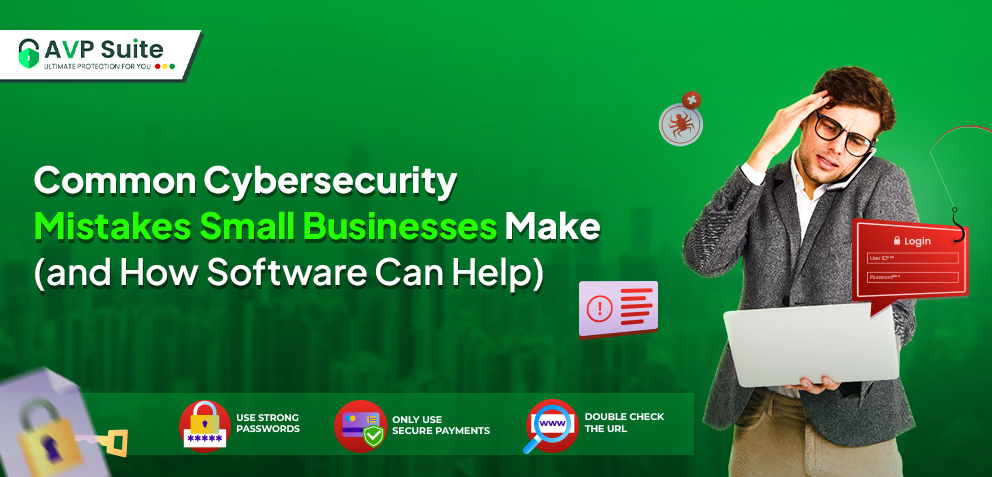Common Cybersecurity Mistakes Small Businesses Make (and How Software Can Help)


Cybersecurity risks can affect any company, no matter how big or small. Small businesses in the US are increasingly at risk from cyberattacks. According to a 2023 report by Verizon’s Data Breach Investigations, small businesses are the target of 43% of cyberattacks. Along with that, these businesses can learn how modern cybersecurity software for businesses can mitigate these problems and defend the company’s digital assets.
These companies are easy targets for hackers because they lack the advanced resources or expertise necessary to build robust defenses. This article explores the most frequent cybersecurity errors that small businesses make.
Small businesses often underestimate cyber threats, leaving them vulnerable to attacks due to common mistakes like weak passwords, outdated software, and a lack of employee training. Here are the common mistakes that small businesses tend to make:
The origins of many breaches come from weak, reused passwords. Regardless of the numerous warnings given, 59% of employees from small businesses confess to using the same password for various accounts. Assaults and stuffing attacks using the brute force method are facilitated by weak passwords.
A business can be crippled by data loss. Yet, almost 60% of small business owners do not back up data regularly. Without backup solutions, ransomware attacks or simple accidental deletions can result in permanent data loss, which brings severe financial damage.
Employees tend to function as the initial line of defense. Social engineering and phishing attempts go unnoticed by a large portion of individuals. The Ponemon Institute has been reporting that 52% of data breaches stem from human blunders or technical errors.
Hackers gain access to out-of-date software due to its unprotected features. Especially, small businesses are known to put off software updates, which in turn makes important systems vulnerable. In 2021, 90% of successful cyberattacks took advantage of previously existing unaddressed vulnerabilities.
Cybersecurity software helps prevent common errors by providing robust protection through features like password management, software updates, threat detection, and employee training modules. Here are the most preferred avenues:
Cybersecurity software designed for small businesses handles system and application updates automatically. Automated Patch Management ensures that all endpoints acquire the most recent defensive measures and appropriate security updates, addressing vulnerabilities before being fully exploited.
These next-generation cybersecurity platforms provide training sessions as part of the software. Tools assist employees by providing lessons and reporting instances of counterfeiting. Consistent training helps reduce human error risks.
Cybersecurity solutions allow businesses to set access permissions based on roles. Access control restricts sensitive information to authorized personnel only. Multi-factor authentication adds another layer of security, making it harder for attackers to gain entry even if they obtain a password.
Business data is copied automatically and kept securely. Backups are completed automatically or on a predetermined schedule, preventing even the busiest teams from overlooking this important task. These cybersecurity software programs for small businesses can restore operations rapidly after a breach or hardware failure.
Hackers exploited a vulnerability in an unpatched point of sale (POS) system of a small retail business located in Texas. The exploit resulted in a data breach that exposed customers’ payment information. If the business had used some form of cybersecurity software with auto-patching enabled, this breach would have most likely been averted.
A marketing agency based in California adopted an integrated cybersecurity solution that included staff training resources. After participating in a few of the training modules, employees were able to spot an elaborate phishing email that would have otherwise gone unnoticed. The company prevented an expensive ransomware attack.
A construction firm in Florida was hit with ransomware that encrypted their files. Thanks to having automated backup software in place, the company was able to restore their data in a matter of hours, which saved them both ransom and business downtime.
While you’re thinking about business security, let’s run through a few quick checks.
Your business could be vulnerable if you don’t check all these boxes, or if there’s even one ‘no.’
Cybersecurity isn’t something small businesses in the USA can just ignore. Cybercriminals actively search for vulnerabilities, and the consequences of a breach extend far beyond financial losses. It is crucial to address common errors such as weak passwords, lack of backups, undertrained staff, and outdated software to secure the future of your company.
Adopting cybersecurity software for small businesses is a cost-effective and easily scalable solution. These systems essentially automate numerous tasks such as patching software, creating backups, managing who can access what, and even providing training. This process not only dramatically reduces your risk but also gives you some much-needed peace of mind.
You should check out AVP Suite’s guide to cybersecurity for a deep dive and tailored recommendations on cybersecurity software for small businesses. The guide is brimming with valuable information. It’s crucial to secure your data, safeguard your company’s reputation, and equip your team with the necessary resources. That’s just smart business. In this game, prevention is always more cost-effective than trying to clean up after a disaster. Plus, it feels like every day there is something new.
The cybersecurity world is constantly changing. Thus, stay informed, stay protected, and treat knowledge as your best line of defense. There’s always more to discover with us to help you navigate it every step of the way.